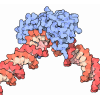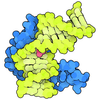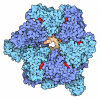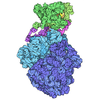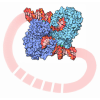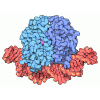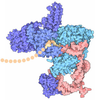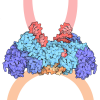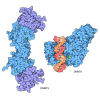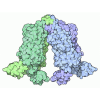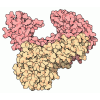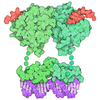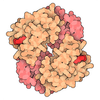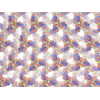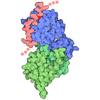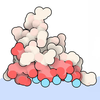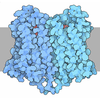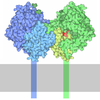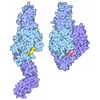Entry Database : PDB / ID : 6gn7Title X-ray structure of the complex between human alpha thrombin and NU172, a duplex/quadruplex 26-mer DNA aptamer, in the presence of sodium ions. (Prothrombin NU172, DNA (26-MER) Keywords / / / / Function / homology Function Domain/homology Component
/ / / / / / / / / / / / / / / / / / / / / / / / / / / / / / / / / / / / / / / / / / / / / / / / / / / / / / / / / / / / / / / / / / / / / / / / / / / / / / / / / / / / / / / / / / / / / / / / / / / / / / / / / / / / / / / / Biological species Homo sapiens (human)synthetic construct (others) Method / / / / Resolution : 2.8 Å Authors Troisi, R. / Russo Krauss, I. / Sica, F. Journal : Nucleic Acids Res. / Year : 2018Title : Several structural motifs cooperate in determining the highly effective anti-thrombin activity of NU172 aptamer.Authors : Troisi, R. / Napolitano, V. / Spiridonova, V. / Russo Krauss, I. / Sica, F. History Deposition May 30, 2018 Deposition site / Processing site Revision 1.0 Oct 17, 2018 Provider / Type Revision 1.1 Oct 24, 2018 Group / Data collection / Database references / Category / pdbx_validate_close_contactItem _citation.pdbx_database_id_DOI / _pdbx_validate_close_contact.auth_atom_id_1 ... _citation.pdbx_database_id_DOI / _pdbx_validate_close_contact.auth_atom_id_1 / _pdbx_validate_close_contact.auth_atom_id_2 / _pdbx_validate_close_contact.auth_comp_id_1 / _pdbx_validate_close_contact.auth_comp_id_2 / _pdbx_validate_close_contact.auth_seq_id_1 / _pdbx_validate_close_contact.auth_seq_id_2 Revision 1.2 Nov 7, 2018 Group / Database references / Category / Item / _citation.titleRevision 1.3 Dec 26, 2018 Group / Database references / Category Item / _citation.page_first / _citation.page_lastRevision 1.4 Mar 27, 2019 Group / Derived calculations / Structure summaryCategory pdbx_molecule / pdbx_molecule_features ... pdbx_molecule / pdbx_molecule_features / pdbx_seq_map_depositor_info / struct_conn / struct_site / struct_site_gen Item _pdbx_seq_map_depositor_info.one_letter_code_mod / _struct_conn.pdbx_dist_value ... _pdbx_seq_map_depositor_info.one_letter_code_mod / _struct_conn.pdbx_dist_value / _struct_conn.pdbx_leaving_atom_flag / _struct_conn.ptnr1_auth_comp_id / _struct_conn.ptnr1_auth_seq_id / _struct_conn.ptnr1_label_asym_id / _struct_conn.ptnr1_label_atom_id / _struct_conn.ptnr1_label_comp_id / _struct_conn.ptnr2_auth_comp_id / _struct_conn.ptnr2_auth_seq_id / _struct_conn.ptnr2_label_asym_id / _struct_conn.ptnr2_label_atom_id / _struct_conn.ptnr2_label_comp_id / _struct_site.details / _struct_site.pdbx_auth_asym_id / _struct_site.pdbx_auth_comp_id / _struct_site.pdbx_auth_seq_id / _struct_site.pdbx_num_residues / _struct_site_gen.auth_asym_id / _struct_site_gen.auth_comp_id / _struct_site_gen.auth_seq_id / _struct_site_gen.label_asym_id / _struct_site_gen.label_comp_id / _struct_site_gen.label_seq_id / _struct_site_gen.pdbx_auth_ins_code / _struct_site_gen.pdbx_num_res / _struct_site_gen.site_id / _struct_site_gen.symmetry Revision 2.0 Jul 29, 2020 Group Advisory / Atomic model ... Advisory / Atomic model / Data collection / Derived calculations / Structure summary Category atom_site / chem_comp ... atom_site / chem_comp / entity / pdbx_branch_scheme / pdbx_chem_comp_identifier / pdbx_entity_branch / pdbx_entity_branch_descriptor / pdbx_entity_branch_link / pdbx_entity_branch_list / pdbx_entity_nonpoly / pdbx_molecule / pdbx_nonpoly_scheme / pdbx_struct_assembly_gen / pdbx_struct_conn_angle / pdbx_validate_close_contact / struct_asym / struct_conn / struct_site / struct_site_gen Item _atom_site.B_iso_or_equiv / _atom_site.Cartn_x ... _atom_site.B_iso_or_equiv / _atom_site.Cartn_x / _atom_site.Cartn_y / _atom_site.Cartn_z / _atom_site.auth_asym_id / _atom_site.auth_atom_id / _atom_site.auth_comp_id / _atom_site.auth_seq_id / _atom_site.label_asym_id / _atom_site.label_atom_id / _atom_site.label_comp_id / _atom_site.label_entity_id / _atom_site.type_symbol / _chem_comp.name / _chem_comp.type / _pdbx_molecule.asym_id / _pdbx_struct_assembly_gen.asym_id_list / _pdbx_struct_conn_angle.ptnr1_auth_seq_id / _pdbx_struct_conn_angle.ptnr1_label_asym_id / _pdbx_struct_conn_angle.ptnr2_label_asym_id / _pdbx_struct_conn_angle.ptnr3_auth_seq_id / _pdbx_struct_conn_angle.ptnr3_label_asym_id / _pdbx_struct_conn_angle.value / _pdbx_validate_close_contact.auth_asym_id_1 / _pdbx_validate_close_contact.auth_asym_id_2 / _pdbx_validate_close_contact.auth_seq_id_1 / _pdbx_validate_close_contact.auth_seq_id_2 / _struct_conn.conn_type_id / _struct_conn.id / _struct_conn.pdbx_dist_value / _struct_conn.pdbx_leaving_atom_flag / _struct_conn.pdbx_role / _struct_conn.ptnr1_auth_asym_id / _struct_conn.ptnr1_auth_comp_id / _struct_conn.ptnr1_auth_seq_id / _struct_conn.ptnr1_label_asym_id / _struct_conn.ptnr1_label_atom_id / _struct_conn.ptnr1_label_comp_id / _struct_conn.ptnr1_label_seq_id / _struct_conn.ptnr2_auth_asym_id / _struct_conn.ptnr2_auth_comp_id / _struct_conn.ptnr2_auth_seq_id / _struct_conn.ptnr2_label_asym_id / _struct_conn.ptnr2_label_atom_id / _struct_conn.ptnr2_label_comp_id Description / Provider / Type Revision 2.1 Jan 17, 2024 Group Data collection / Database references ... Data collection / Database references / Derived calculations / Refinement description / Structure summary Category chem_comp / chem_comp_atom ... chem_comp / chem_comp_atom / chem_comp_bond / database_2 / pdbx_initial_refinement_model / struct_conn Item _chem_comp.pdbx_synonyms / _database_2.pdbx_DOI ... _chem_comp.pdbx_synonyms / _database_2.pdbx_DOI / _database_2.pdbx_database_accession / _struct_conn.pdbx_leaving_atom_flag
Show all Show less
 Yorodumi
Yorodumi Open data
Open data Basic information
Basic information Components
Components Keywords
Keywords HYDROLASE / Thrombin-DNA /
HYDROLASE / Thrombin-DNA /  G-quadruplex /
G-quadruplex /  Aptamer / Duplex/Quadruplex
Aptamer / Duplex/Quadruplex Function and homology information
Function and homology information thrombin / neutrophil-mediated killing of gram-negative bacterium /
thrombin / neutrophil-mediated killing of gram-negative bacterium /  regulation of blood coagulation / ligand-gated ion channel signaling pathway / Defective F8 cleavage by thrombin ...positive regulation of lipid kinase activity / positive regulation of phospholipase C-activating G protein-coupled receptor signaling pathway / cytolysis by host of symbiont cells / thrombospondin receptor activity / Defective factor XII causes hereditary angioedema /
regulation of blood coagulation / ligand-gated ion channel signaling pathway / Defective F8 cleavage by thrombin ...positive regulation of lipid kinase activity / positive regulation of phospholipase C-activating G protein-coupled receptor signaling pathway / cytolysis by host of symbiont cells / thrombospondin receptor activity / Defective factor XII causes hereditary angioedema /  thrombin / neutrophil-mediated killing of gram-negative bacterium /
thrombin / neutrophil-mediated killing of gram-negative bacterium /  regulation of blood coagulation / ligand-gated ion channel signaling pathway / Defective F8 cleavage by thrombin / Platelet Aggregation (Plug Formation) / negative regulation of platelet activation / negative regulation of astrocyte differentiation / positive regulation of collagen biosynthetic process / negative regulation of cytokine production involved in inflammatory response / positive regulation of blood coagulation / negative regulation of fibrinolysis / Gamma-carboxylation of protein precursors / Transport of gamma-carboxylated protein precursors from the endoplasmic reticulum to the Golgi apparatus / Common Pathway of Fibrin Clot Formation / Removal of aminoterminal propeptides from gamma-carboxylated proteins /
regulation of blood coagulation / ligand-gated ion channel signaling pathway / Defective F8 cleavage by thrombin / Platelet Aggregation (Plug Formation) / negative regulation of platelet activation / negative regulation of astrocyte differentiation / positive regulation of collagen biosynthetic process / negative regulation of cytokine production involved in inflammatory response / positive regulation of blood coagulation / negative regulation of fibrinolysis / Gamma-carboxylation of protein precursors / Transport of gamma-carboxylated protein precursors from the endoplasmic reticulum to the Golgi apparatus / Common Pathway of Fibrin Clot Formation / Removal of aminoterminal propeptides from gamma-carboxylated proteins /  fibrinolysis / regulation of cytosolic calcium ion concentration / Intrinsic Pathway of Fibrin Clot Formation / Peptide ligand-binding receptors / positive regulation of release of sequestered calcium ion into cytosol /
fibrinolysis / regulation of cytosolic calcium ion concentration / Intrinsic Pathway of Fibrin Clot Formation / Peptide ligand-binding receptors / positive regulation of release of sequestered calcium ion into cytosol /  Regulation of Complement cascade / acute-phase response / Cell surface interactions at the vascular wall /
Regulation of Complement cascade / acute-phase response / Cell surface interactions at the vascular wall /  lipopolysaccharide binding / negative regulation of proteolysis / positive regulation of receptor signaling pathway via JAK-STAT /
lipopolysaccharide binding / negative regulation of proteolysis / positive regulation of receptor signaling pathway via JAK-STAT /  growth factor activity / positive regulation of insulin secretion /
growth factor activity / positive regulation of insulin secretion /  platelet activation / response to wounding / Golgi lumen / positive regulation of protein localization to nucleus / Regulation of Insulin-like Growth Factor (IGF) transport and uptake by Insulin-like Growth Factor Binding Proteins (IGFBPs) / positive regulation of reactive oxygen species metabolic process /
platelet activation / response to wounding / Golgi lumen / positive regulation of protein localization to nucleus / Regulation of Insulin-like Growth Factor (IGF) transport and uptake by Insulin-like Growth Factor Binding Proteins (IGFBPs) / positive regulation of reactive oxygen species metabolic process /  blood coagulation / antimicrobial humoral immune response mediated by antimicrobial peptide / Thrombin signalling through proteinase activated receptors (PARs) /
blood coagulation / antimicrobial humoral immune response mediated by antimicrobial peptide / Thrombin signalling through proteinase activated receptors (PARs) /  heparin binding / regulation of cell shape / positive regulation of cell growth / G alpha (q) signalling events / collagen-containing extracellular matrix / blood microparticle / cell surface receptor signaling pathway / positive regulation of phosphatidylinositol 3-kinase/protein kinase B signal transduction / positive regulation of protein phosphorylation / G protein-coupled receptor signaling pathway /
heparin binding / regulation of cell shape / positive regulation of cell growth / G alpha (q) signalling events / collagen-containing extracellular matrix / blood microparticle / cell surface receptor signaling pathway / positive regulation of phosphatidylinositol 3-kinase/protein kinase B signal transduction / positive regulation of protein phosphorylation / G protein-coupled receptor signaling pathway /  endoplasmic reticulum lumen /
endoplasmic reticulum lumen /  signaling receptor binding / serine-type endopeptidase activity /
signaling receptor binding / serine-type endopeptidase activity /  calcium ion binding / positive regulation of cell population proliferation /
calcium ion binding / positive regulation of cell population proliferation /  proteolysis /
proteolysis /  extracellular space / extracellular exosome / extracellular region /
extracellular space / extracellular exosome / extracellular region /  plasma membrane
plasma membrane
 Homo sapiens (human)
Homo sapiens (human) X-RAY DIFFRACTION /
X-RAY DIFFRACTION /  SYNCHROTRON /
SYNCHROTRON /  MOLECULAR REPLACEMENT /
MOLECULAR REPLACEMENT /  molecular replacement / Resolution: 2.8 Å
molecular replacement / Resolution: 2.8 Å  Authors
Authors Citation
Citation Journal: Nucleic Acids Res. / Year: 2018
Journal: Nucleic Acids Res. / Year: 2018 Structure visualization
Structure visualization Molmil
Molmil Jmol/JSmol
Jmol/JSmol Downloads & links
Downloads & links Download
Download 6gn7.cif.gz
6gn7.cif.gz PDBx/mmCIF format
PDBx/mmCIF format pdb6gn7.ent.gz
pdb6gn7.ent.gz PDB format
PDB format 6gn7.json.gz
6gn7.json.gz PDBx/mmJSON format
PDBx/mmJSON format Other downloads
Other downloads https://data.pdbj.org/pub/pdb/validation_reports/gn/6gn7
https://data.pdbj.org/pub/pdb/validation_reports/gn/6gn7 ftp://data.pdbj.org/pub/pdb/validation_reports/gn/6gn7
ftp://data.pdbj.org/pub/pdb/validation_reports/gn/6gn7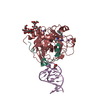
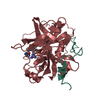
 Links
Links Assembly
Assembly
 Components
Components Thrombin / Coagulation factor II
Thrombin / Coagulation factor II
 Homo sapiens (human) / References: UniProt: P00734,
Homo sapiens (human) / References: UniProt: P00734,  thrombin
thrombin Thrombin / Coagulation factor II
Thrombin / Coagulation factor II
 Homo sapiens (human) / References: UniProt: P00734,
Homo sapiens (human) / References: UniProt: P00734,  thrombin
thrombin / Mass: 1405.271 Da / Num. of mol.: 1
/ Mass: 1405.271 Da / Num. of mol.: 1

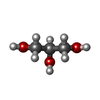




 Glycerol
Glycerol Water
Water X-RAY DIFFRACTION / Number of used crystals: 1
X-RAY DIFFRACTION / Number of used crystals: 1  Sample preparation
Sample preparation
 SYNCHROTRON / Site:
SYNCHROTRON / Site:  ESRF
ESRF  / Beamline: MASSIF-1 / Wavelength: 0.9677 Å
/ Beamline: MASSIF-1 / Wavelength: 0.9677 Å : 0.9677 Å / Relative weight: 1
: 0.9677 Å / Relative weight: 1 
 molecular replacement
molecular replacement Processing
Processing :
:  MOLECULAR REPLACEMENT
MOLECULAR REPLACEMENT Movie
Movie Controller
Controller


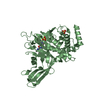

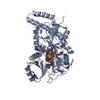


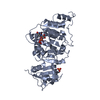

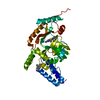

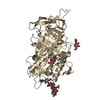
 PDBj
PDBj